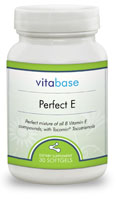| Vitamin E acetate is a dry, powder form of vitamin E that has no antioxidant power until the acetate is removed in the intestine as it is absorbed. The acetate form of vitamin E is called an ester. The ester of vitamin E is more stable to light and oxygen than
tocopherol. The shelf-life of the ester tocopheryl is greater than that of the unesterified tocopherol. Vitamin E acetate is a pleasant-tasting form of powdered vitamin E that can be eaten right off the spoon. Tocopheryl acetate is naturally converted by the body to vitamin E.
The commonly available source of stable vitamin E used in animal feed is synthetic dl-alpha-tocopheryl acetate, which exists in equal amounts of eight isomers. Dl-alpha-tocopheryl acetate is an all-synthetic form of alpha-tocopherol. An alternative natural form of stable vitamin E is d-alpha-tocopheryl acetate, which is derived from vegetable oils and exists in the form of one isomer. D-alpha-tocopheryl acetate is the acetate ester of natural-source d-alpha-tocopherol. D-alpha-tocopheryl acetate is produced by coupling racemic isophytol with trimethylhydroquinone to form d1-tocopherol. The synthesized version, dl-alpha-tocopheryl acetate exists in equal amounts of eight isomers while the natural extraction from vegetable oils, d-alpha-tocopheryl acetate, exists only as one isomer. D-alpha-tocopheryl acetate (natural) may be a better alternative to increase tissue levels and retention of vitamin E compared to dl-alpha-tocopheryl acetate (synthetic). Vitamin E forms are listed as either plain "tocopherol" or tocopheryl followed by the name of what is attached to it, as in "tocopheryl acetate". The two forms are not greatly different. However, plain tocopherol may be absorbed a little better, while tocopheryl attached forms have a slightly better shelf life.
Vitamin E acetate is a powerful antioxidant, possessesing the ability to increase the moisturisation of the skin's horny layer and thereby improve surface relief. D-Alpha-tocopheryl acetate is used in topical skin care products. It appears that it can diffuse into skin cells where it is converted to d-alpha-tocopherol. D-alpha-tocopherol may protect skin against ultraviolet damage and is also a skin moisturizer. The activity of natural or natural-source alpha-tocopherol (RRR alpha-tocopherol), on an equal weight basis, is at least twice as high as synthetic alpha-tocopherol. This is mainly because half of the stereoisomers of synthetic alpha-tocopherol are not maintained in human plasma and are, therefore, not bioavailable.
| 